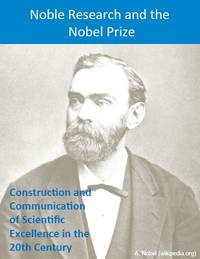Noble Research and the Nobel Prize
International Conference
Heinrich Heine University, Mickeln House, Dusseldorf
November 16-18, 2016
In his will of 1895, the Swedish engineer, inventor and entrepreneur Alfred Nobel laid the foundation for five prizes in physics, chemistry, physiology or medicine, literature, and peace to those who had "conferred the greatest benefit on mankind". Since more than hundred years, the Nobel Prize is considered the most prestigious benchmark of scientific excellence. Today, it is used for ranking universities and gauging the scientific reputation of whole nations. This makes it the ideal example for investigating the mechanisms of scientific recognition.
We will take on this task by deconstructing the aura surrounding the award as well as the selection process of the laureates.
This symposium intends to deepen our understanding of how this ultimate accolade is constructed, which processes behind the scenes result in the award and how the prize is presented to laymen all over the world.
How has excellence been enacted throughout the 20th century, and how have particular achievements been selected and acknowledged as the most excellent in their respective fields?
What is the essence of scientific recognition, how has it changed over time?
What impact do prestigious prizes have on various levels, from the single individual to the state, and how are they interpreted or used in terms of political actions and different forms of capital and prestige?
Programme
Wednesday, November 16, 2016, Mickeln House, 7 pm, arrival and welcome
Thursday, November 17, 2016, Mickeln House, 9 am
9:00 am
Welcome and introduction (Heiner Fangerau, Nils Hansson)
Keynote
9:15 Jacalyn Duffin, Kingston/Ontario: Commemorating excellence: the Nobel Prize and the historical sociology of science
10.00 Coffee
I. Nobel laureate biographies and networks pre- and post-Prize
Chair: Heiner Fangerau, Dusseldorf
10:10 Ulrike Enke, Marburg:
„Der erste zu sein” (To be the first one) – The Nobel Prize for the “saviour of the children”, Emil von Behring, in 1901
10:40 Aant Elzinga, Gothenburg:
The search for a formula to make an akward candidate compatible - the case of Albert Einstein and his Nobel prize
11:10 Axel C. Hüntelmann, Berlin:
The networking and construction of scientific excellence. Paul Ehrlich and the Nobel Prize.
11:40 Coffee
II. Noble Research and Nobel Prize narratives
Chair: Thorsten Halling, Dusseldorf
12:00 Scott H. Podolsky, Boston: From Global Recognition to Global Health: Antimicrobials and the Nobel Prize
12:30 David S. Jones, Boston: When Noble Research Goes Unrecognized: The Case of Coronary Artery Bypass Surgery
1:00 – 2:00 Lunch
III. Research at Nobel Prize archives and at the Nobel Prize museum
Chair: Nils Hansson, Dusseldorf
2:00 Kalle Grandin, Stockholm:
Archival Excellence: What answers, and furthermore what questions, do we find in the Nobel archives?
2:30 Katarina Nordqvist, Stockholm: Nobel Prize awarded discoveries and commercialization – the role of the Laureates
3:00 Gustav Källstrand, Stockholm: Organizing and Celebrating Scientific Excellence: The History of the Nobel Foundation
3:30 – 4:00 Coffee, fruit
5:15 Transport to House of the University
6.30-10.00 pm Public Lecture by Erling Norrby, Stockholm: Nobel Prizes and Notable Discoveries (House of the University, Schadowplatz 14, Dusseldorf), presented by the Department for the History, Philosophy, and Ethics of Medicine, North Rhine-Westphalian Academy of Sciences, Humanities and the Arts, House of the University
Friday, November 18, 2016, Mickeln House, 9 am
IV. Communicating scientific excellence
Chair: Matthis Krischel, Dusseldorf
9:00 Annette Tuffs, Nuremberg: The Nobel Prize as marketing tool
9:30 Massimiano Bucchi, Trento: From Visibility to Celebrity: Nobel science laureates in the media
10:00 – 10:15 Coffee
10:15 Sven Widmalm, Uppsala: The Nobel Prize and the rhetoric of neutrality during the Third Reich
10:45 Thomas Schlich, Montreal: How to Define Excellence? Nobel Prizes in Surgery in the early 20th Century
11:15 – 11:30 Coffee
V. How Not to Win a Nobel Prize
Chair: Maria Griemmert, Dusseldorf
11:30 Nils Hansson, Dusseldorf: The staging of Excellence: Mechanisms of scientific recognition in the Nobel Prize Archive for physiology or medicine 1901–1950
12:00 Ragnar Björk, Stockholm: Inside the Nobel Committee on Medicine: Prize competition procedures 1901-1950 and the fate of Carl Neuberg
12:30 Heiner Fangerau, Dusseldorf: Why not an American for the First Nobel Prize? Internationalism in medicine at the turn of the 20th Century
1:00 Final discussion, information on the planned anthology documenting the symposium, and farewell
1:30 Lunch
Download programme



